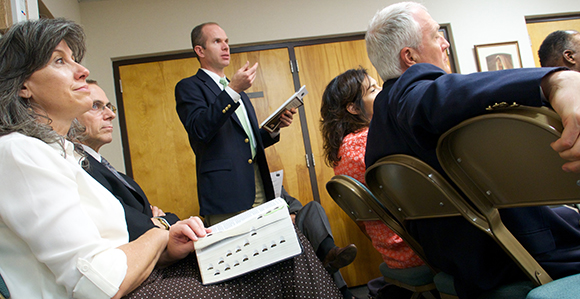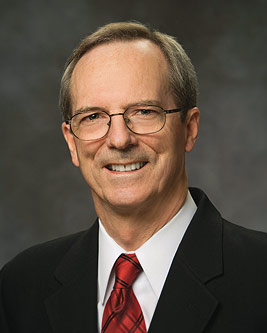Think Sunday School Is Boring? Ask What You Can Do to Contribute
Contributed By Brother Tad R. Callister, Sunday School general president

A member participates in a Sunday School class in Littleton, Colorado. Alma taught that the learner has an equal responsibility to that of the teacher to contribute to the success of a class.
Article Highlights
- Come a little better prepared to class.
- Pray for the learners as well as the teacher to have the Spirit.
- Step outside our comfort zone and participate in class discussions.
- Record spiritual impressions and share them with others.
“If we do not put much into our Church classes, we are unlikely to get much out of them. On the other hand, when we do contribute, our learning can become exponential.” —Brother Tad R. Callister, Sunday School general president
It was the Passover immediately preceding the crucifixion. The Savior “sat down with the twelve.” He then made the startling announcement that one of them would betray Him. Human nature might have caused them to point their finger at someone else, but instead the depth of their character was revealed as each inquired, “Is it I?” (see Matthew 26:19–22). In other words, am I the one who is at fault?
Perhaps in that same spirit, before we come to the conclusion that a teacher is boring or uninformed or not up to our expectations, we as learners could adopt the “is it I?” principle. For example, we might ask of ourselves, “Did I read the lesson material in advance? Did I offer a silent prayer for the teacher? Did I contribute by participating in class? Did I seek divine impressions and record them? Did I share what I learned with others?“ If we have somehow fallen short in these endeavors, then we might further ask: “Am I a partial cause for the class not being all I hoped it would be and, if so, how can I improve? How can I be a better learner and class member?”
What do I contribute to class?
Alma put our role as learners in its proper perspective: “the preacher was no better than the hearer, neither was the teacher any better than the learner; and thus they were all equal“ (Alma 1:26; italics added). That is a remarkable insight—the learner has an equal responsibility to that of the teacher to contribute to the success of a class. The Savior taught this same principle in the Doctrine and Covenants. He first enjoined the teacher to “preach my gospel by the spirit.” He then enjoined the listener to receive the word by the “spirit of truth.” He then promised that if each would fulfill his role that “both would be edified and rejoice together” (D&C 50:14, 19, 22).

Brother Tad R. Callister, Sunday School general president
Elder Bruce R. McConkie (1919–85) spoke of the consequences when learner and teacher are not equal: “Sometimes a speaker [teacher] brings a jug of ‘living water’ that has in it many gallons. And he pours it out on the congregation [or class]. And all that the members have brought was a single cup; and that’s all they took away. Or maybe, they had their hand over the cup and they didn’t get anything to speak of” (”The Seven Deadly Heresies,“ BYU fireside address, June 1980). He then explained that the reverse happens when the teacher is less prepared than the learners.
Caring “like blazes”
The Lord spoke reprovingly of those learners who came with a small cup or perhaps no cup at all to receive His gospel message (see Mark 8:17). Suffice it to say, He desires us to be active, alert, avid learners of His gospel.
J. B. Priestly, an English novelist, was once asked how he became such a famous writer since some of his equally gifted peers, as youth, had not so excelled. He responded: “The difference between us was not in ability, but in the fact that they merely toyed with the fascinating idea of writing. I cared like blazes! It is this caring like blazes that counts” (J.B. Priestly, Rain, 178). Somewhere, sometime we must care like blazes if we really want to learn the gospel of Jesus Christ. That must have been the condition of the Saints in Berea, for Paul said that they “were more noble than those in Thessalonica, in that they received the word with all readiness of mind” (Acts 17:11).
How can we contribute as learners?
We can all contribute to the spirit of our Sunday classes by choosing to do some or all of the following:
- Coming a little better prepared to class
- Praying for the learners as well as the teacher to have the Spirit
- Stepping outside our comfort zone and participating in class discussions
- Recording spiritual impressions and sharing them with others
For the last few years I have tried to record doctrinal insights and spiritual impressions I receive at church. I can honestly say I have been richly rewarded. This approach has changed my perspective; it has accelerated my learning and increased my anticipation for church. When I started recording insights and impressions received at church, I was pleasantly surprised at how much better the speakers and teachers had become in such a short period of time.
The consequences of contributing

If we do not put much into our Church classes, we are unlikely to get much out of them.
President Boyd K. Packer (1924–2015) spoke of the value of contributing by sharing an experience in the life of Belle Spafford. He said that shortly after Sister Spafford was called as the Relief Society general president, she met with President George Albert Smith. In the course of this meeting, she recommended the Church drop its membership in one national and one international women’s organization. The prophet inquired, “Had they not held membership for well over a half century in these organizations?” Sister Spafford acknowledged that was true but then explained how costly it was to travel to these board meetings and that occasionally they even became the subject of humiliation. Then she added: “We don’t get a thing from these councils.” The wise prophet responded, “You want to withdraw because you don’t get anything out of it?” “That is our feeling,” she replied. He then responded: “Tell me, what is it that you are putting into it?” He then said with considerable firmness: “You continue your membership in these councils and make your influence felt.” Later she shared how she had become president of one of these organizations (“The Relief Society,” Ensign, Nov. 1978, 9).
The lesson taught was critical. If we do not put much into our Church classes, we are unlikely to get much out of them. On the other hand, when we do contribute, our learning can become exponential. In fact, the Lord has promised: “And unto you that hear [and contribute] shall more be given” (Mark 4:24).
